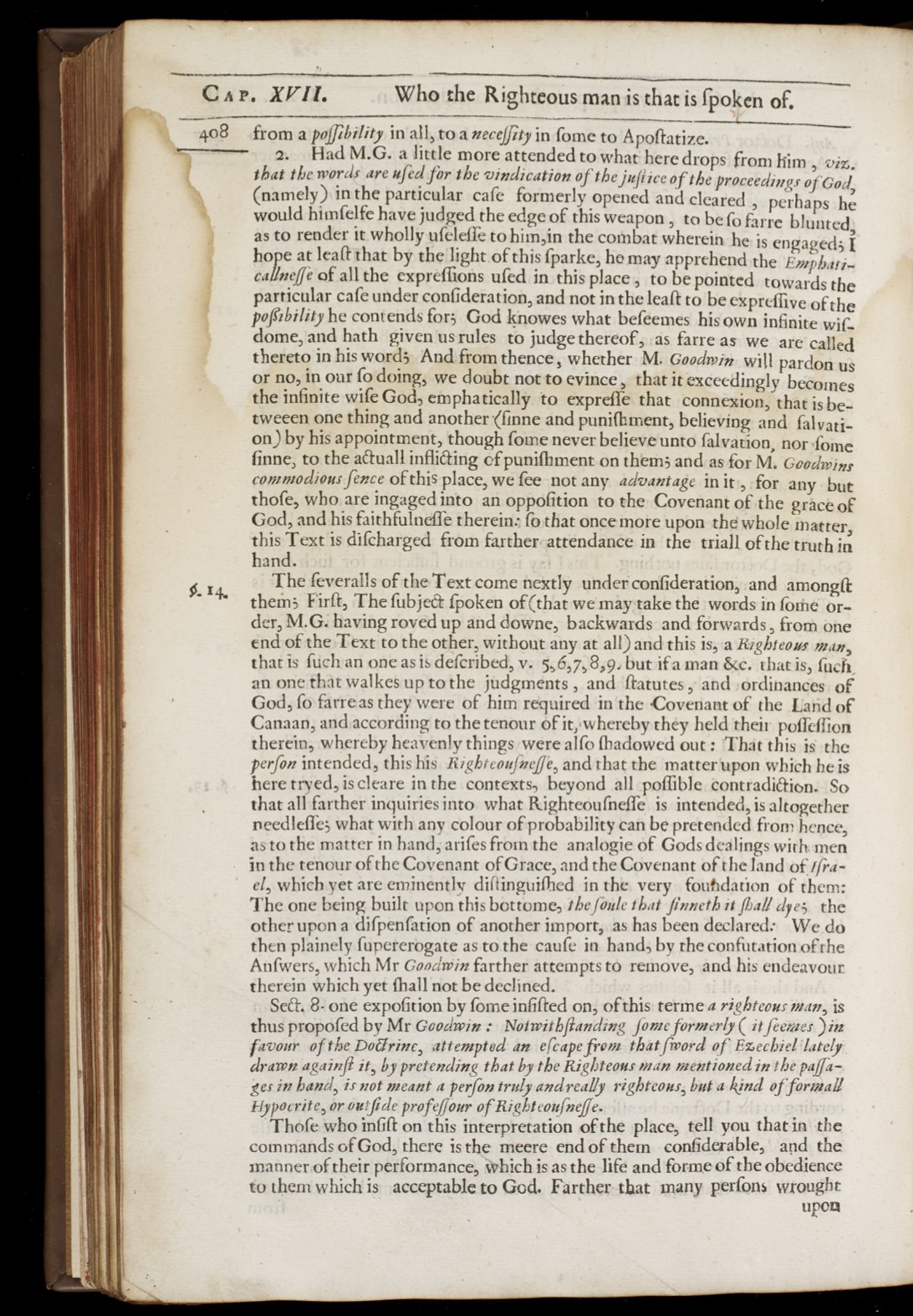

Car.
XVII.
Who the Righteous
man
is
that
is
fpoken
of.
408
from
a
poffìbility
in
all,
to
a
necety
in
fome
to
Apoftatize.
2.
Had M.G.
a
little
more attended to what
here drops from
him
,
viz,
that
the words
are
ufed
for
the
vindication
of
the
juflice
of
the proceedings
of
God,
(namely)
in
the particular
cafe
formerly opened
and cleared
,
perhaps
he
would himfelfe have
judged the
edge
of
this
weapon
,
to
be
fo
farre blunted;
as
to render
it wholly
ufeleffe
to him,in the combat
wherein
he
is
engaged;
I
hope
at
leaft
that
by
the
light
of
this fparke, he may apprehend the
Enphati-
callneffe
of
all
the
expreffions ufed
in
this place
,
to
be pointed towards the
particular
cafe
under confideration, and
not
in
the
leaf}
to
be
expreffive
of
the
poßibility
he contends for;
God
knowes what befeemes
his
own
infinite wif-
dome, and hath
given
us
rules
to judge
thereof,
.
as
farre
as
we are
called
thereto
in his
word;
And from thence
,
whether
M.
Goodwin
will
pardon
us
or
no,
in
our
fo
doing,
we
doubt not to
evince
,
that
it exceedingly
becomes
the
infinite
wife
God, emphatically
to
exprefl'e
that
connexion, that
is
be-
tweeen
one
thing
and another-(finne and punifhment, believing and
falvati-
on)
by his
appointment, though
fome never believe
unto
falvation, nor
Tome
finned
to
the
a&uall infli&ing
of
punifhment
on
them;
and
as
for
M.
Goodwin:
commodious
fence
of
this place, we
fee
not
any
advantage
in it
,
:
for
any
but
thofe,
who are ingaged
into
an
oppofition
to the
Covenant
of
the
grace
of
God,
and
his
faithfulneffe
therein
fo
that once
more upon
the
whole
matter,
this
Text
is
difcharged from farther attendance
in
the
trials
of
the truth
in
hand.
The
feveralls
of the Text
come nextly
under
conGderation, and
amongft
them;
F'irft,
The
fubje&
fpoken
of(that
we
maytake
the words
in
forne
or-
der,
M.G. having roved up and downe, backwards and forwards
,
from one
end
of
the
Text to
the other, without
any
at
all)
and this
is,
a
Righteous
man,
that
is
fuch an
one
as
is
defcribed,
v.
5,6,7,
8,g, but
if
a
man &c.
that
is, fuch,
an one
that
walkes up
to
the judgments
,
and
ftatutes,
and ordinances
of
God,
fo
farre
as
they were
of
him
required
in
the
Covenant
of
the Land
of
Canaan, and,according
to the tenour
of
it,,wherebythey
held
their
poffeffion
therein,
whereby heavenly things were alfo fhadowed out
:
That
this
is
the
perfon
intended,
this
his
Righteoufneffé,
and that the matter
upon
which
he
is
here
tryed,
iscleare in
the contexts,
beyond
all poffible
contradi
&ion. So
that
all
farther
inquiries
into what
Righteoufneffe
is
intended,
is
altogether
needlefl'e;
what with
any
colour
of
probability
can
be pretended
from hence,
as
to the
matter
in
hand;
arifes
from
the
analogie
of
Gods dealings
with.
men
in the
teneur
of
the Covenant
of
Grace,
and
the Covenant
of
the
land
of
which
yet are eminently diflinguifhed
in
the very
foufidátion
of
them:
The
one being
built
upon
this
bottome,
thefoule
that
fi'nneth
it
fhall
dyes
the
other
upon a difpenfation
of
another import,
as
has
been declared:
We do
then plainelyfupererogate
as
to
the
caufe
in
hand,
by
the
confutation
ofrhe
Anfwers, which Mr
Goodwin
farther
attempts to remove, and
his endeavour
therein which
yet fhall'not be declined.
Se&.
8.
one expofition by fome
infifted
on,
of
this terme
a
righteous man,
is
thus propofed byMr
Goodwin
:
Notwithflanding
fome
formerly
(it
feemes
)in
favour
of
the
Dotirine,
attempted
an
efcape
from
that
(word
o
f
Ezechiel lately
drawn againfl
it,
by
pretending
that
by
the Righteous man
mentioned
in
the
paffa-
ges
in
hand, is not meant
a
perfon
truly
and
really righteous, but
a
kind
of
formal/
Hypocrite,
or
out
f
de
profeffour
of
Righteoufneffe.
Thofe
who
infift
on
this
interpretation
of
the
place, tell you
that
in
the
commands
of
God, there
is
the
meere end
of
them
confiderable, and
the
mannerof
their performance,
Which
is
as
the
life
and forme
of
the
obedience
to
them which
is
acceptable
to
God.
Farther that
many perlons
wrought
upon










